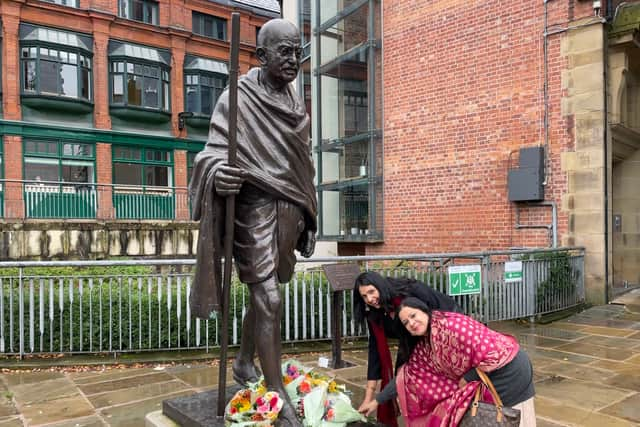Gandhi’s links to the North West celebrated at Manchester Cathedral


Manchester Cathedral was the location chosen for a special commemoration service to mark the anniversary of the birth of the iconic political leader Mahatma Gandhi.
Leaders and delegates from both Manchester and India gathered in the city to mark the 152nd anniversary of the birth of the man who created a philosophy of non-violent resistance and made a massive contribution to India gaining its independence from Britain.
Advertisement
Hide AdAdvertisement
Hide AdThe special service also brought to mind Gandhi’s own visits to the UK, and particularly to the North West, during his life.
What happened to mark Gandhi’s birthday?
To mark the 152nd anniversary of Gandhi’s birth an interfaith service was held at Manchester Cathedral.
Officials from the governments of the UK and India as well as from the University of Manchester attended alongside dignitaries including the Lord Mayor for the City of Manchester Coun Tommy Judge, High Sheriff for Greater Manchester Diane Mary Hawkins, director of the Nehru Centre Amish Tripathi, director of the Manchester Museum Esme Ward and The Very Reverend Rogers Govender MBE, the Dean of Manchester Cathedral.
There were recitals by the Yvonne Shelton Choir as well as dance and musical performances.
Advertisement
Hide AdAdvertisement
Hide AdRepresentatives of Hinduism, Islam, Jainism, Sikhism and Christianity attended and there were readings by people of different faiths as well as speeches praising the city’s multiculturalism.
At the end candles were lit for peace, unity, non-violence, compassion and hope in Manchester.
Before the service the celebrations got under way with a flower offering ceremony at Mahatma Gandhi’s statue in front of the cathedral.


The impressive nine-foot bronze sculpture was a gift to Manchester to commemorate Gandhi’s 150th birthday in 2019.
Advertisement
Hide AdAdvertisement
Hide AdDid Gandhi visit the North West?
In 1931 Gandhi visited Lancashire to speak about the plight of Indian cotton workers while his boycott of English goods was going on.
Trouble was anticipated but instead photographs from the time show he received a warm welcome in working-class towns.
The director of the Manchester Museum, Esme Ward, spoke about this episode in the cathedral during her contribution to the anniversary service.
The events of the commemoration also recalled a visit to London made by Gandhi to put forward the plight of Indians in South Africa.
Advertisement
Hide AdAdvertisement
Hide AdHe brought with him a copy of Atmasiddhi Shastra, a poetic work by his spiritual mentor, and the launch of a new book including a commentary on the verses took place during the day in Manchester.
What did those involved say?
Professor Erinma Bell MBE, Deputy Lieutenant for Greater Manchester, said: “It was very enlightening, interesting and soothing.
“I found the event peaceful and hopeful and got a feeling of the way Mahatma Gandhi was level headed, patient and calm.”


Organisers said they hoped the day would remind people of Gandhi’s teachings in a world riddled with conflicts and turbulence.
Advertisement
Hide AdAdvertisement
Hide AdThey said his principles of building empathy and understanding among communities are as much needed now as they were during his life.
A controversial figure?
For much of the time since Gandhi’s death his achievements and his philosophy of non-violent resistance have been admired and praised around the world.
In India he is revered, his birthday is a national holiday and his face adorns coins.
But in recent years a more troubling picture has been painted, with Black activists, scholars and communities drawing attention to racist comments he made about Africans while he was in South Africa.
Advertisement
Hide AdAdvertisement
Hide AdA Gandhi statue was removed from one campus in Ghana and there have been calls elsewhere on the continent for a rethinking of his legacy.
Fresh focus has also been put on his attitudes to women and sex in the wake of movements such as #MeToo.
Comment Guidelines
National World encourages reader discussion on our stories. User feedback, insights and back-and-forth exchanges add a rich layer of context to reporting. Please review our Community Guidelines before commenting.
